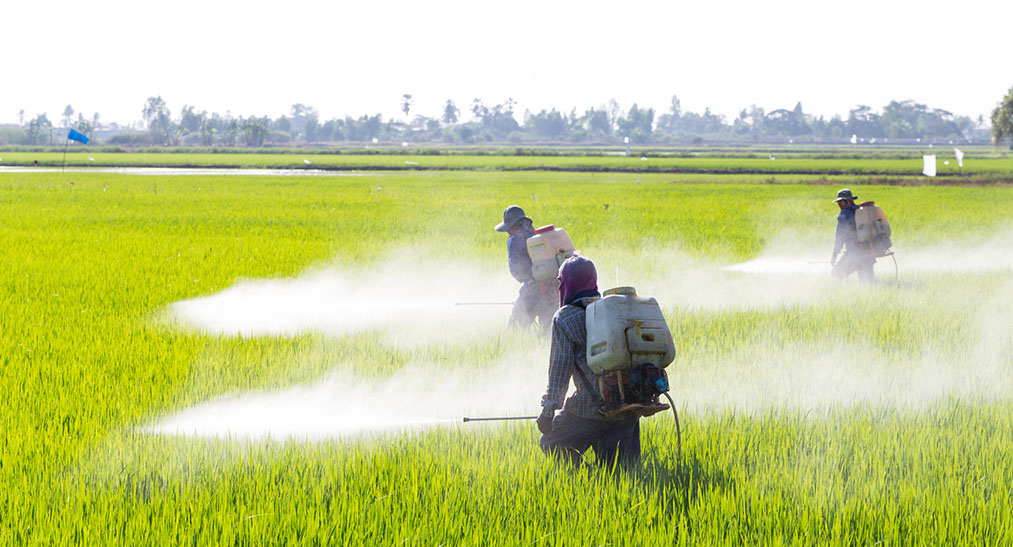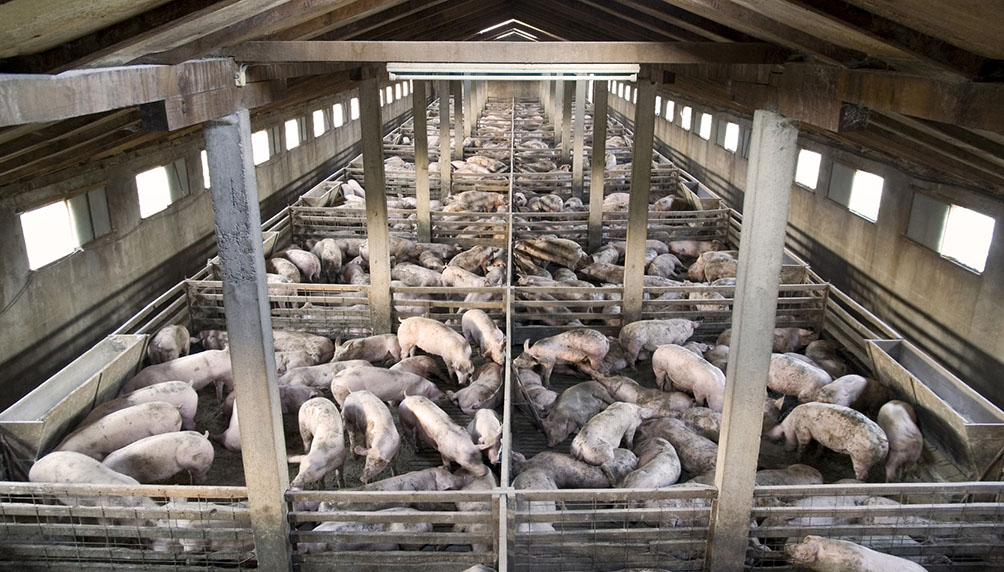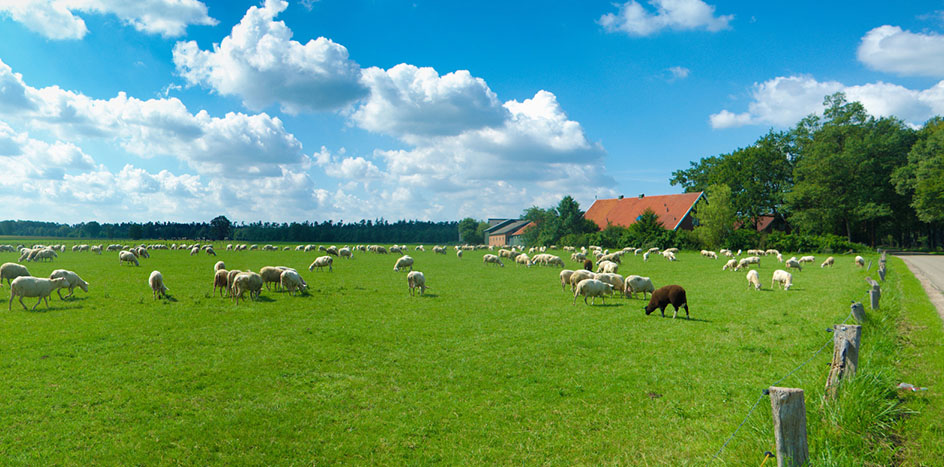
Corporations largely dictate people´s diet!
Few people today have control over their diet! Most consumers rely on affordable products in the largely corporate-dominated markets. In everyday life, usually only financially well situated consumers can choose their food and drinks freely. Nevertheless, for the sake of simplicity, many of these privileged people voluntarily renounce this possibility and leave the selection of their food to biased companies. Besides the lack of time and information, an important reason for this are the celebrities and other attractive persons paid by food and beverage enterprises, who make its brands palatable to gullible and uncritical consumers. “Good” advertising distracts consumers from the fact, that decision-makers in the food industry and their trading partners under pressure due to the competition, think less on the health of their customers and on animal welfare as well as environmental aspects of the production, than on their intended sales and profits. That is why they often focus on fast-selling items in their assortment, which are sold without any effort, and on products with high profit margins. The latter are strategically placed in markets and advertised intensively. Such a simple knit manipulation already entices many consumers to buy these goods. In addition, consumers are flooded with food advertising from all sides and systematically influenced in their purchasing behavior. Children and adolescents in particular, but also many uncritical adults, are largely defenseless against the increasingly subtle seduction of experienced marketing and advertising professionals. The lack of transparency in food and beverages, as well as market distortions, make objective buying decisions difficult or impossible even for mature consumers. All the more so, since apart from their prices, tastes, looks and consistencies, further essential characteristics, as well as modalities of the procurement and production of food and beverages, would have to be assessed.

As a rule, more precise informations about the origin, about possible consequences for the health and about the ecological footprints of the offered products, are missing. The suppression of several relevant details concerning the methods of exploitation and production, as well as effects of alimentation products, violates essential rights of consumers to information and prevents sustainable shopping! In addition, the deliberate withholding of such information neglects the importance given by a steadily growing proportion of the population to issues such as consumer health, humane treatment of animals, preservation of ecosystems, protection of the environment and of small producers, while the food industry at the same time continues unhindered to encourage unacceptable exploitations of humans, animals and nature.
Politics supports exploitation and destruction!
Healthy and sustainable nutrition is vital for people, society and livestock. This alone justifies all possible steps to maximize the availability of high-quality and relevant information. These come mainly from nutritional sciences, human and veterinarian medicine, specialized associations and in part also from findings proven over millennia, such as those from the teachings of Ayurvedic and Traditional Chinese Medicine. Serious public health problems would be defused by spreading such knowledge, which would massively reduce the barbarities of intensive livestock farming, slow down the disappearing of small farmers and drastically mitigate the environmental impact of food production and trade. In addition, there is every reason to hope that educating people about healthy and sustainable nutrition will help to level the extreme contradictions between the abundance of food in rich industrialized nations on the one hand, and the malnutrition prevalent in poor countries on the other hand. For the food habits that are rampant in industrialized countries with their proliferating product diversity and considerable amounts of food wastes, cause poverty and hunger in poor nations. The increasing globalization of trade in food, drinks and agricultural products, and the politically supported ignorance of consumers, cause many fatal developments for uncountable people, creatures and the environment.

Largely uncontrolled releases of pesticides, some of which have been banned for safety reasons in many industrialized countries, cause intoxications of people, as well as poisoning of soils and water bodies, thereby causing numerous casualties year after year.
Countless people in poor countries have had to sell the farmland that feeded them and their families out of necessity, in order to survive in the short term. Frequently, plantations have been created there for cultivating coveted agricultural products for export, such as palm oil, to the detriment of local populations. This product alone, of which several hundred million tons are processed each year for various industrial foodstuffs, has cost many thousands of small peasants in the countries of origin the existence, and many of them their lives. At the same time, the oil palm monocultures established on hundreds of thousands of hectares destroyed the biodiversity there. Despite the devastating social and environmental effects of palm oil production, key politicians around the world stay unperturbed by these dramas in its countries of origin. The EU, as the main consumer of palm oil, extended the carte blanche for continued destructions of natural forests for more oil palm plantations and further exploitations of living beings and their environment.
Nutrition education is a public task
The health of each individual is far too valuable to be entrusted solely to selfish commercial interests of others. Under no circumstances should it be subjected to profit targets of market participants in the food production, trade, transport and advertising businesses! For this reason, every person should learn as much as possible about healthy nutrition and be allowed to align its alimentation accordingly. Only such knowledge protects against the ubiquitous manipulation of consumers by relevant and biased corporations and their overzealous helpers from politics and media. The dissemination of knowledge about healthy food and drinks is an essential prerequisite for societies with as many mature and healthy people as possible. It protects consumers from health risks due to improper diet and from highly questionable instrumentalisations of increasingly opaque processes in the food production. The more so, because rapidly developing technology lets all too creative food engineers forget about ethics and moral limits, as shows the very discrete utilisation in food and beverages of the flavor enhancer HEK 293 over many years, the origins of which go back to cells extracted in the 1970s from dead human fetuses!
Furthermore, transparence in food productin and widely propagated knowledge about it protect countless animals from merciless exploitation in complete anonymity, the existence of small farmers and the environment.

In addition, such knowledge saves natural communities and centuries-old cultural landscapes from ultimate destruction. Thanks to the knowledge about healthy and ecologically sound as well as ethically acceptable nutrition, the chances of a long-overdue turn towards sustainable agriculture and a globally meaningful production of foods and beverages in harmony with nature and the true needs of the people would increase.
In order to break the fatal vicious circles in the production and marketing of food as soon as possible, consumers should be given a general and comprehensive nutrition education. Naturally, this task of clearly public interest should be granted to state institutions, such as schools and state media, which are predestined for this purpose. It makes sense to start such an important educational offensive as a compulsory program from the time of school entry, to keep it up to date and to deepen it until the end of the school career. It would need to be supported by ongoing information from all public media. Only in this way will this education mission meet with the importance of healthy nutrition and eco-social effects on the one hand and correspond to the challenges imposed by the increasing complexity of food production and marketing on the other hand. The initial EU-wide inclusion of comprehensive nutrition education in all state schools and media programs is a logical educational approach with far-reaching improvements for public health, social welfare, agriculture, the environment and biodiversity, and also offers huge savings potential for energy, agrochemical expenditure and extremely questionable subsidies.
Foods of animal origin can be harmful to health!
Meat, fish, crustaceans, shellfish and products derived from them are the most expensive foods because they cause the death of the animals producing them, set an end of the value creation from these animals, and usually require additional efforts for the searching or rearing and killing of further animals. But also various dairy products, eggs, honey and other foods of animal origin, which do not require the killing of animals, are in general more expensive than vegetable foods, and throw far higher profits than these. Foods of animal origin are mainly consumed by customers with higher purchasing power and make up a rapidly growing proportion of food markets, especially in rich industrialized nations. The better earnings prospects in this product group favor subsidies for them and lead to intensive promotion of such products in the trade. As a result, meter-long refrigerated shelves full of meat, sausages, pâtés, fishes and various seafood, as well as a vast variety of cheeses, yoghurts, milk, and milk-based desserts are filling up markets in wealthy countries. With the exception of vegans and customers committed to organic products, many consumers either succumb to the food abundance displayed in front of them, or to appetite-inducing advertisements in the markets, and buy high-priced products of animal origin. This completes an ever-expanding consumption spiral, where whopping profits boost the production of various foods of animal origin, subsequently filling large shelf space in many markets, which increase advertising to sell them, what in turn boosts their sales and profits, which further increase the production and keep this consumption cycle going on.

Since over-nutrition with animal products creates health problems, the downsides of the still young, but already ill, affluent society with its steadily growing appetite for animal products are already emerging: cardiovascular diseases are nowadays the leading cause of deaths in industrialized nations. Unhealthy diets with too many animal fats play a crucial role in this development. In many countries, the abundance of animal fats in combination with lack of exercise leads to rampant obesity, which is now threatening more and more children and adolescents. Foods of animal origin are also responsible for the transmission of various diseases. Furthermore, problems due to food allergies and intolerances also demonstrably increase with the consumption of products of animal origin. Last but not least, numerous cases of poisons in livestock feed and heavy metals or other problematic substances in many animals intended for human consumption cause concern. In the meantime, several poisons are burdening not only numerous products from livestock of various species, but also such from wild animals taken from nature, as well as fish, shellfish and crustaceans up to honey from an increasingly polluted environment.
Transparency concerning foods of animal origin is overdue!!
The majority of the food of animal origin consumed worldwide comes from livestock. These animals usually do not survive long and die for the sole purpose of satisfying the human appetite for such products. The rest of the food of animal origin comes mainly from fishing, aquaculture and hunting. In most cases, the production of such foods is associated with a great deal of unnecessary suffering in the pursuit, keeping, transportation and killing of the animals involved. Persons involved in this processes have learned their approach to the animals from relatives and acquaintances or in relevant businesses, and their lack of consideration for the animals is usually adopted without querying it. They make money with them or use the animals for their own consumption and, moreover, hardly ask any questions. With the habituation to animal tormenting manners, their sensitivity to the animals blunts dull, whereby the stress and torments, as well as the unfortunate destinies of these farm animals become simple routines for them. Animal cruelty eliminates in the perpetrators any compassion with their victims and lets them in the end act like insensitive machines. The largely unnecessary suffering of the animals used for the production of foodstuffs can only persist because they are hidden from the vast majority of end consumers.
LIFE UNION strives for a respectful relationship between consumers and their animal “food producers”. The unacceptable suffering of farm animals must urgently and everywhere made known and stopped thanks to the information of the consumers. The many abuses occuring during the catching, transporting and killing of animals from the wild intended for human consumption must also be ruthlessly uncovered and ended as soon as possible.
In addition to enormous animal welfare problems, the exploding consumption of foods of animal origin causes in many places serious consequences for traditional societies, natural ecosystems and the environment. For example, the world’s largest tropical forest, shrinks alone in the Brazilian Amazon region many thousands square kilometers each year to make room for herds of cattle, the meat of which is exported to four continents. These forests are usually destroyed along with their impressive biodiversity, thus exposing local indigenous tribes to the downfall. The slash-and-burn process and the drying out of moist soils for preparing new pastures for the cattle, release huge amounts of CO². Climate impacts from CO² emissions associated with livestock farming are said to far exceed those of car traffic, but surprisingly are only rarely discussed publicly, even though enormous amounts of the much more climate-damaging methane emissions from digesting cattle are produced!
Only by broadening the awareness of uncritical consumers can the numerous perversions be prevented, which are caused by the production of many products of animal origin at the expense of diverse living beings. Extensive transparency in the production of foods of animal origin is the key to responsible treatment, not only of the animals therefore exploited so far, but also of the affected people, nature and environment!
LIFE UNION therefore calls for the establishment of an open information system for various foods of animal origin, beginning in the European Union. A freely accessible database shall enable all interested persons to immediately obtain via the Internet at any time the information relevant to purchase decisions concerning foodstuffs of animal origin offered in the EU. In order to ensure the necessary transparency, detailed information about the places and methods of production, about feeding, live animal transport, slaughter age and killing methods must be included.
Please help us to finally realize humane living conditions for tens of millions of exploited food animals, and thereby make a significant contribution to healthy and sustainable nutrition and environmentally sound agriculture!

